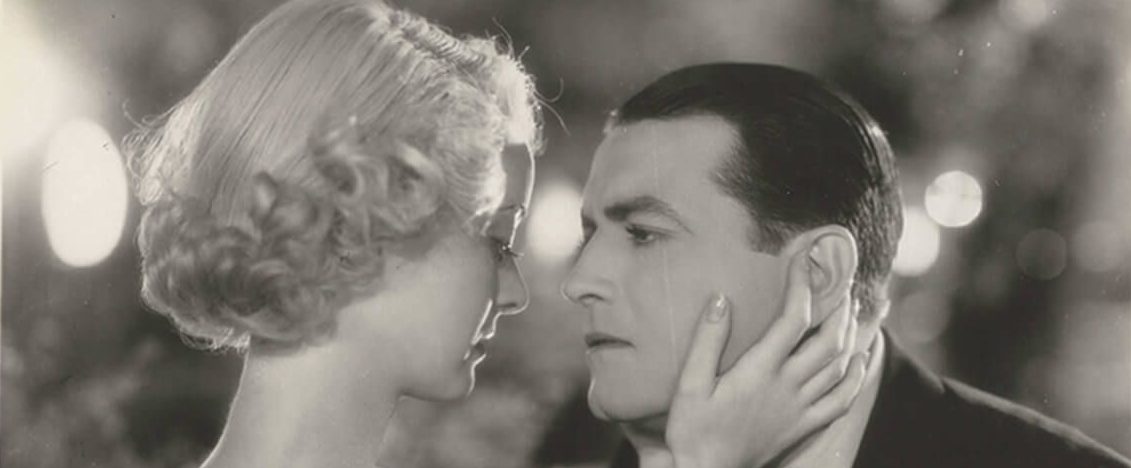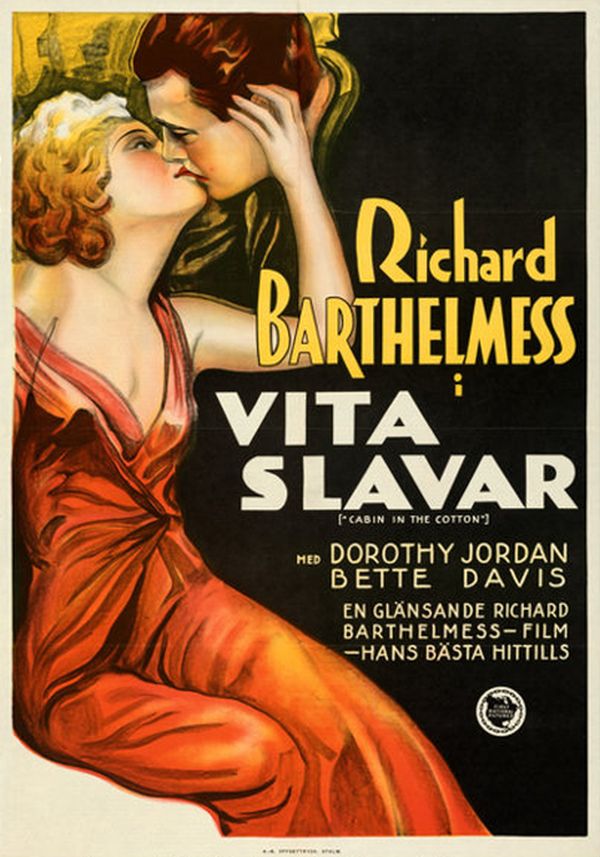 Cabin in the Cotton (1932) is the story of the struggle between landowners and their farming tenants in the rural South, and is most notable for Bette Davis’ supporting role as Madge Norwood, the beautiful blonde daughter of a wealthy landowner.
Cabin in the Cotton (1932) is the story of the struggle between landowners and their farming tenants in the rural South, and is most notable for Bette Davis’ supporting role as Madge Norwood, the beautiful blonde daughter of a wealthy landowner.
The film begins with a written notice that the producers don’t intend to take sides in the conflict between the poor tenants and the rich landlords. During this introduction, we’re told that the tenants are known as “peckerwoods,” as though the term means “poor cotton picker,” but as we all know, it means much more than that. I wondered through most of the film if I was supposed to take the use of the word as a crass insult or as a regional peculiarity; the IMDb trivia section indicates that director Michael Curtiz simply didn’t know what a “peckerwood” was, which may explain the confusion. It should be noted that this movie pre-dates the 1940s Jive slang term of the same name, and is used specifically as a derogatory term by rich whites for poor whites, as the word’s roots in African and African-American folklore have, confusingly, been entirely ignored. It’s a confounding and offensive mess.
The scene opens with Mr. Norwood, played aptly by Burton Churchill with the most accurate Southern accent I’ve yet heard on film, surveying the work of poor tenant workers picking cotton on his fields. This family of tenants is ragged and tired and the father has recently been sick. Norwood wants to know where their oldest boy is. Tom (the father) explains he’s in school, but Norwood demands the boy be taken out of school so he can pick cotton in Norwood’s fields.
 The boy is Marvin, played by Richard Barthelmess. He returns home after school to find his father resting after a hard day. Unfortunately, Barthelmess — apparently playing a high school-aged boy — looks ridiculous. He’s at least 20 years too old for the part and made up like a silent movie idol, complete with heavy eyebrow makeup, face powder and too much lipstick. The makeup comes and goes during the film, and the change from scene to scene is quite distracting.
The boy is Marvin, played by Richard Barthelmess. He returns home after school to find his father resting after a hard day. Unfortunately, Barthelmess — apparently playing a high school-aged boy — looks ridiculous. He’s at least 20 years too old for the part and made up like a silent movie idol, complete with heavy eyebrow makeup, face powder and too much lipstick. The makeup comes and goes during the film, and the change from scene to scene is quite distracting.
Much of Cabin in the Cotton looks like a silent film, especially the framing of Barthelmess, who is usually portrayed in the standard close-up designed for emoting actors: framed from mid-torso up. The action of many actors is directed to show what’s going on without words, which makes the dialogue stilted and unnecessary. For example, after Marvin returns home, he finds his father, Tom, dead on the bed, done in by exhaustion. In a classic silent film maneuver, Marvin, his sister and his mother all huddle together and stare wide-eyed at Tom’s body for several seconds. When the silence was broken, I was startled to hear a voice instead of seeing a title card.
Norwood decides, with prodding from his daughter Madge, to put Marvin through school. At first I thought he was paying for Marvin’s college — Marvin is played by a 37-year-old man, after all — but it’s clear from the montage that putting him through school meant he finished high school. After graduating, Marvin goes to work in Norwood’s store.
The store lends credit to the tenant farmers, of course, and we all know from history that these landowners hit tenants with high prices and high interest rates to make even more money from these poor workers. However, the movie doesn’t go into much detail about the scamming of the tenants, possibly to try to appear less controversial. The local District Attorney looks through Norwood’s books and vaguely mentions the huge interest rates of 50% to the tenants, but the DA isn’t particularly scandalized by this and Marvin doesn’t look concerned, either. There’s too little emphasis on the landowner’s unethical accounting, which results in a watered-down plot.
Marvin’s mother remarries almost immediately to a man named Sock Fisher. Marvin discovers from Norwood that cotton is being stolen from his land and that Sock and his son Jake are the prime suspects, but there’s no proof. The DA, played drunkenly by John Marston, investigates for Norwood and asks Marvin about the thefts. Norwood decides that a birthday party for Betty, Marvin’s poor sweetheart, would be a good place for Marvin to snoop around about the stolen cotten and try to find proof of the thieves’ identity. Marvin essentially agrees and doesn’t appear too nervous about spying on his own kin.
Then again, Marvin rarely looks concerned or nervous. Barthelmess has one emotion, and I don’t know what it is. See that still of him above? That’s how he looks in every scene. He just stares as though he’s trying desperately to look like a normal human being, only he isn’t quite sure how. Occasionally he has a hollow smile, or he stands up straight — he’s usually got a painful looking slouch — but otherwise he just stares. It’s creepy, and by the end of the film I wanted to smother him with a pillow and crash through a window to escape.
The Barthelmess Stare makes Marvin’s ineffectual simpering worse. Marvin never stands up to anyone, and his actions are so random that one can’t decipher what his motivation is. Coupled with the presentation of each side’s story — the wealthy landowners are too sympathetic, while the poor tenants are far too cruel and selfish — the point of the film gets muddied beyond hope. An excellent example occurs during Betty’s birthday party. First we see Marvin suspicious of all the extra food stored in Uncle Joe’s larder. It appears that he is spying on the tenants, although later we discover he never intended to tell anyone about Uncle Joe’s extra stores. Why spend so much time showing Marvin frowning in Uncle Joe’s larder if there’s no payoff?
Marvin’s Uncle Joe — who is also Betty’s father, which is a bit awkward — approaches Marvin to tell him that they’ve been stealing Norwood’s cotton and want Marvin to broker it for them in Memphis. Only when Marvin demurs does Uncle Joe say that Norwood’s been stealing from them, and they’re simply taking what’s rightfully theirs to make up the difference. Like the interest charged them, this is only briefly noted. It’s so unconvincing that it sounds like an excuse, like the justifications of someone who is simply trying to manipulate Marvin.
And that’s what most of the tenants do: manipulate Marvin. Marvin’s step-father tries to weasel store credit, which Marvin refuses, until his own mother walks in and demands free food. He gives her some and she brusquely demands free candy for the baby. No one considers that Marvin’s education and office job are potentially a good thing and they shouldn’t jeopardize that. Later, his family causes him more grief when Uncle Joe tricks Marvin into stealing some cotton so he’d be complicit in their crime.
It’s not just the tenants who take advantage of Marvin. During the birthday party, Madge and a rich boyfriend peek in the window and giggle at the tenants as they dance. The next day Madge asks Marvin to come to a huge party she’s throwing with a professional jazz band and tons of guests. She wants him there as her boyfriend, but to also show everyone how to do the Peckerwood Wiggle, apparently since she saw him dancing it the night before. He cheerfully accepts, and there’s absolutely no sign of him being offended, so again I’m just not sure how to take it. Her reaction — “Cuuuuute! I’d like to kiss ya but I just washed my hair! Bye!” — seems a bit condescending, but by the time of the party, she’s fully infatuated with Marvin. If she’s using him, her legitimate crush takes the edge off. Yes, the dance is a case of the upper class treating the lower classes like a novelty, but it’s hard to consider it anything but misguided immaturity, as Madge is supposed to be Marvin’s age, the late teens or early 20s.
Meanwhile, when the all-Black jazz band arrives in town, the racist tenants make fun of Marvin when he helps them find their rooms: “Yeah, fetch them water, Marvin,” says Uncle Joe. “Yeah, be a chambermaid for a bunch of yellow saxophone students,” adds another. It’s unpleasant. Only the tenants show any racism toward the jazz band, although I suppose racism is implied with the dialogue from the blind musician (Clarence Muse, who I recognized as Snoe from my childhood favorite, The Black Stallion), who comments that the Norwood’s house reflects “the great glory of the white man.”
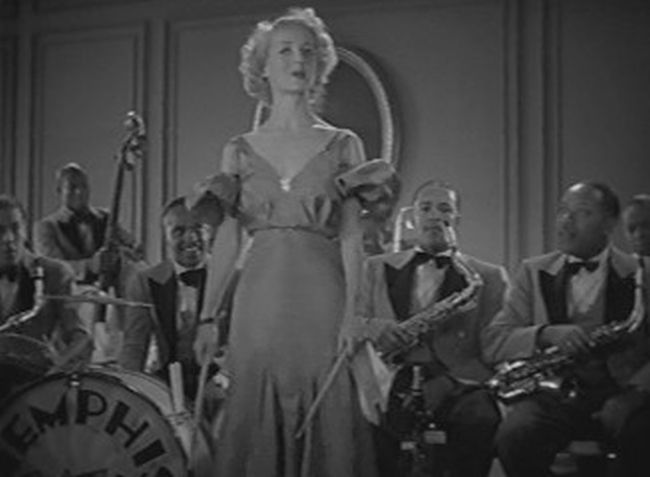
That night the same group of tenants who were hostile to the jazz band snoop around to see the party. While peeking in the windows, they see the Peckerwood Wiggle and get offended. These tenants have been sneaking around the Norwood home, hiding behind bushes, peeping in windows, leering at Madge and making comments about her body. Sure, it’s a parallel to her peeking into the window at Betty’s party, but a giggle from a young girl is quite different than a group of middle-aged men acting like peeping toms. One tenant jealously sneers at Marvin and says, “Look at him trying to be somebody.”
Bette Davis’ Madge is one of the few reasons to watch this film. Highly sexual and confident, Madge smokes, parties, and when leaving the car of a rich boyfriend, breezily tells him, “Better luck next time!” She’s modern in both style and acting while the rest of the film is dated and stilted. Even the promotional pictures show the conflicting styles, where her appearance is in stark contrast to Barthelmess’ aged silent movie star look. Davis was promoted as a blonde bombshell when this movie was released. As a result of her stunning performance, she was listed by Variety as a top box office attraction of 1932. The movie ads for Cabin apparently featured Davis and Barthelmess kissing (I’ve only been able to find one small, blurry copy of the ad in question) with the text: “Meet a new kind of temptress! Flaming as southern suns, bewitching as plantation moons, she’ll teach you a new kind of love.” [1]

During the party, Marvin and Madge escape into the night. Madge has been pursuing Marvin for most of the film and pleads with him during the party to “love me”. Marvin doesn’t realize there’s a difference between “love me” and “I love you”, so he naively pledges his love to her; she snuggles up to him and sings “Willie the Weeper”.
Marvin was invited to live with the Norwoods, and when his stepfather kicks him out of his own home, he takes them up on it. Shortly afterward, a tenant named Bill kills one of the foremen. A posse goes in search for Bill and Marvin finds him first. Urging him to run, he inadvertently draws attention to the guy, who is lynched while Marvin looks on, horrified. Yet he just stands there, unmoving, not even taking a step towards the mob and not bothering to yell loudly enough for anyone to hear him. It is impossible to like Marvin at this point.
The posse returns only to find the store in flames. A tenant has set the building on fire and stolen the account books so that debts against them can’t be collected. Marvin discovers this when he runs into the flaming store to get the books for his employer. He risked his life just so Norwood could collect debts against the tenants, which is confusing enough, but more so because we quickly discover Marvin had a duplicate set of accounts and didn’t need to run into the store at all. Marvin is hesitant to give the books to Norwood because he’s so upset about the lynching. Norwood says he needs time to calm down, and Marvin — again — does nothing except hang his head.
Marvin tries to leave the Norwoods that Sunday but is stopped by Madge, who wines and dines him, then seduces him by stripping nude while singing “Willie the Weeper”. He stays with Madge (of course he did – who wouldn’t stay with that kind of incentive?) but is called by his ex-sweetheart Betty to meet with the tenants later that day.
The tenants have been increasingly distrustful of Marvin. Marvin hasn’t ratted them out, but he now holds the only set of Norwood’s accounting books. The tenants want him to destroy them and therefore eliminate their debts. Uncle Eph guilt trips Marvin with accusations that his dead father would hate to see how Marvin had turned out. No one attacks Marvin for his uselessness, apparent misplaced loyalty or his lack of backbone, they simply attack him for being educated, which I find misguided. The kid had a chance to go to school and get an office job and took it, and he hasn’t turned snitch or been unfair to the tenants. Meanwhile the tenants keep pushing him to steal and cheat and lie on their behalf, careless of what would happen to Marvin if caught. They’ve murdered and burned down another’s property and threatened him, and say Marvin won’t give them the accounting books because he wants to “tie up” with Madge (a rather vulgar way of putting it).
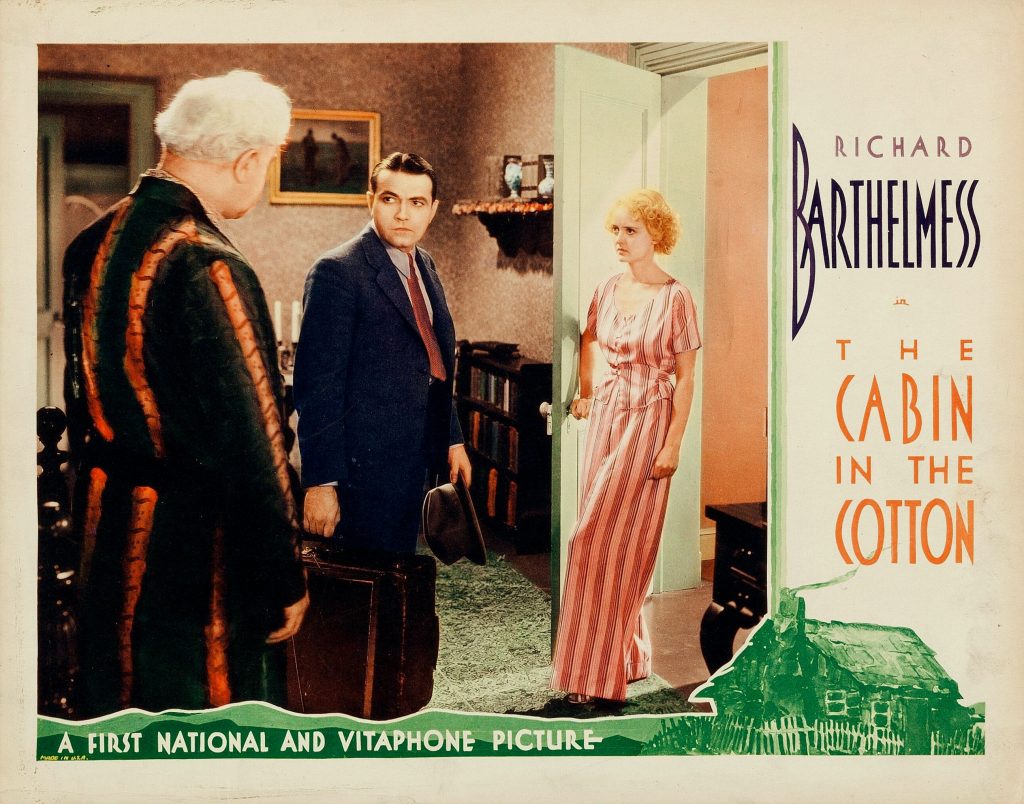
Marvin doesn’t listen to much of this outburst. The one thing he does consider is Uncle Eph’s insistence that his father Tom was worked to death by Norwood. Marvin runs back to Norwood’s and finds proof that Norwood did indeed cook the books in order to pocket Tom’s profit. Marvin tries to run off but Madge stops him; unable (or unwilling) to leave, the next morning he meets with the DA and asks for help. The DA suggests Marvin stay with him while organizing a town meeting where Marvin can settle the entire issue. That seems awfully lofty for a young boy who hasn’t shown any leadership qualities thus far.
The meeting starts and Marvin begins his unlikely, purple prose about how landowners do indeed take risks and deserve to make their money, but the tenants are downtrodden and worn out and stealing is their way of “playing fair”. He continues by claiming Madge’s car and hiring of a jazz band are somehow unfair to the tenants. Norwood stands up and says that’s not the whole story: he provides them gardens for food but they let the plants die, he provides them houses that they ruin, and he even provided cows to people who needed milk but the tenants complained it wasn’t enough milk. Marvin replies that Norwood may provide all these things, but in the end he still owns these items and the tenants own nothing. Finally, he makes a good point!
In the meeting, Norwood suddenly turns into an entitled jerk. He’s disheveled and smug, and when he calls the tenants “peckerwoods” this time, they all yell at him for it, and I wonder why Marvin never had a problem being addressed with that term. When Marvin suggests a new contract that’s more fair to the tenants, all the other landowners agree to sign it, while Norwood is the sole hold-out. Madge is the only one who agrees with him, saying, “Don’t you sign it, Daddy. Don’t let no whickerbill white get the best of ya.” (“Whickerbill” is another term for “white trash” and also, in a few regions, is a term that means “foreskin.” Why both “peckerwood” and “whickerbill” have double meanings involving penises is beyond me and I don’t mind confessing that I have no intention of spending my day looking up the etymology behind all this nonsense.)
There’s a clarity in everyone’s intentions in the finale that simply was not shown in the movie before. There was no foreshadowing, no hint that the Norwoods were just pretending to be moderate, nothing about how all other landowners in town were fair and the Norwoods were greedy scoundrels. During the film, even during the trial scene, Madge shoots her father stern looks when she thinks he’s gone too far. Yet a moment after one of her stern looks, she suddenly agrees that the tenants are undeserving of a better contract.
The meeting ends with Marvin blackmailing Norwood into signing the contract. This may have been intended as Marvin’s big stand, his chance at redeeming himself after being struck impotent by his prior indecision, but instead the sudden flip-flops of Norwood and Madge make this hollow and unconvincing. I can only conclude that this quick-filmed, tacked-on ending was intended to mitigate the previous 80 minutes.
As Marvin leaves, he sees his two loves: Betty in a wagon and Madge in her car. Madge, who a moment ago hated him, and who surely must be upset that Marvin forced her dad into signing a contract she disagreed with, smiles invitingly at Marvin as though she’s forgotten the meeting ever took place. Betty smiles at Marvin as well, and he chooses Betty – virtue over wealth, of course. Madge looks genuinely disappointed, and doesn’t flounce off in a seethe like a vamp. There’s quite a disconnect in this ending, as Betty (Dorothy Jordan) had very few scenes and never came across as anything but a giggling girl with no personality; the audience has all but forgotten Betty and we’re jarred out of the story when we see Marvin deciding she’s his true love.
This film needed more than the pre-existing assumption that the land owner is by default evil. Until the finale, Norwood is portrayed as mild-mannered and likable, and the malice necessary to prove that he’s not just rich, but rich because he screwed people over, was missing. When we get the one piece of evidence that he cheated Tom out of $180.00, the film assumes that the audience will accept it as proof of Tom being killed by Norwood without further examination. Similarly, we needed more than the assumption that the poor tenants were an automatically virtuous group, especially as the intended parallels between tenants and landowner weren’t remotely equal.
Further, Madge was intended as a selfish vamp who lured Marvin away from his true love, but one never got the impression that there was evil in her heart, which is a key element for a vamp. Madge was the reason to watch this film, and there was conflict between what Marge needed to be for the story, and what Marge needed to be for the publicity department.
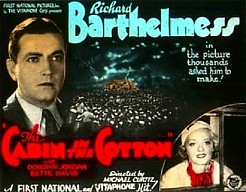 “Cabin in the Cotton” was a moderate success but met with almost universal critical dismissal. Barthelmess’ career slowed down tremendously after the transition to talkies. He continued starring in films for a few years after “Cabin”, including the embarrassingly pedestrian “Cental Airport” in 1933, but never achieved the success he had in silents. Within just two years he had almost completely disappeared from the screen. Bette Davis’ star was on the rise, of course, and this was one of the roles which propelled her toward “Of Human Bondage” and true stardom.
“Cabin in the Cotton” was a moderate success but met with almost universal critical dismissal. Barthelmess’ career slowed down tremendously after the transition to talkies. He continued starring in films for a few years after “Cabin”, including the embarrassingly pedestrian “Cental Airport” in 1933, but never achieved the success he had in silents. Within just two years he had almost completely disappeared from the screen. Bette Davis’ star was on the rise, of course, and this was one of the roles which propelled her toward “Of Human Bondage” and true stardom.
SOURCES & LINKS
[1] From The Star System: Hollywood’s Production of Popular Identities by Paul McDonald, p 51

